Episodes
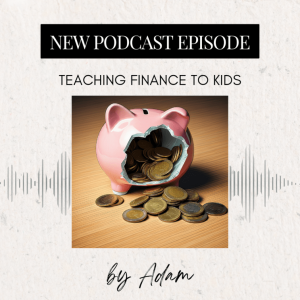
Thursday Aug 29, 2024
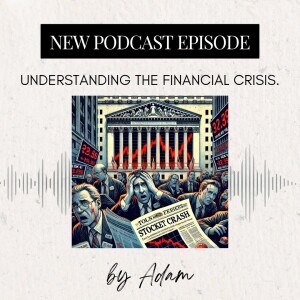
Tuesday Aug 27, 2024
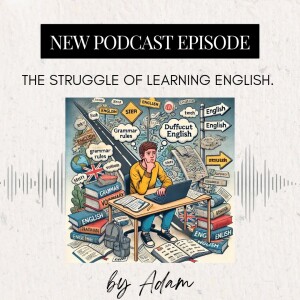
Monday Aug 26, 2024
Monday Aug 26, 2024
Welcome to today's podcast, where we dive deep into the world of independent English learning. With more learners moving away from traditional classrooms, discover how you can take control of your learning journey and maximize your progress.
We explore the benefits of self-directed learning, from personalized study plans to increased motivation through autonomy. Learn why the myth of learning styles has been debunked and what truly matters for effective learning.
Delve into proven strategies like active learning, spaced repetition, and interleaved practice. Understand the power of metacognition and how being aware of your learning strategies can significantly improve your outcomes.
Embrace technology with tools like Duolingo, Babbel, and language exchange platforms. Turn multimedia content into active learning exercises and discover the benefits of writing in English.
Stay motivated with practical tips, including setting SMART goals, the two-minute rule, and habit stacking. Finally, we share data-backed evidence showing the effectiveness of these methods in boosting retention and problem-solving skills.
Join us as we equip you with the tools and knowledge to make your independent English learning journey a successful and enjoyable one.
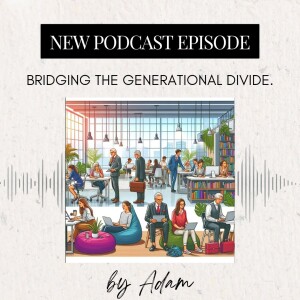
Saturday Aug 24, 2024
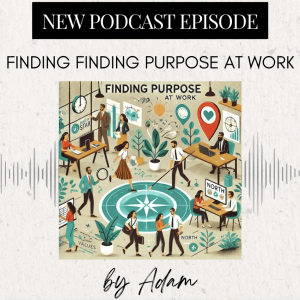
Friday Aug 23, 2024
Friday Aug 23, 2024
Hello, good morning, and thank you once again for joining me today. In this episode, we delve into a topic that has become central to our professional lives: the search for purpose at work. We'll explore how the quest for purpose has emerged as a significant aspect of the modern work experience, especially for the younger generation.
We'll discuss the concept of purpose at work from both an individual and organizational perspective, examining how our purpose influences and is influenced by our work environment. The episode will also touch on the impact of the COVID pandemic on our professional aspirations and how it has prompted many to reflect deeply on the meaning of their work.
We'll look at the importance of starting with the individual in understanding purpose and how companies should facilitate, not dictate, an employee-centered purpose. Research shows that individuals who view their work as a calling report higher levels of job and life satisfaction. We'll also discuss the generational shift in how purpose is perceived, particularly among millennials.
The episode will highlight the benefits for organizations that support employees in finding and living their purpose at work, including higher levels of engagement, loyalty, and performance. We'll also examine the distinction between passion and purpose and the pivotal role leaders play in fostering a sense of purpose within their teams.
Finally, we'll reflect on the personal journey of finding purpose and how simple reflective practices can guide you towards a clearer sense of what truly brings you joy and fulfillment. Join us as we explore the intertwined journey of personal values and professional roles in the search for purpose at work.
Thank you again for joining me today, and I look forward to seeing you again very soon.

Thursday Aug 22, 2024
Thursday Aug 22, 2024
In this episode, we delve into the pressing issue of our society's dangerous dependency on cars. Our relationship with cars is not just a bad habit; it's a toxic addiction that is harming our health, environment, and society at large. We explore how we got here, the environmental impacts, and the deep social inequalities exacerbated by our car-centric culture.We reflect on the temporary shift during the COVID-19 pandemic, revealing a glimpse of a less car-dependent world. Expert insights, including those from Professor Tim Schwarren, highlight the urgency of breaking this habit and the need for a comprehensive transport policy that offers genuine alternatives to cars.Join us as we discuss practical solutions, from investing in public transportation to rethinking urban design, and the crucial role of political will and public participation in driving systemic change towards a more sustainable and equitable future.
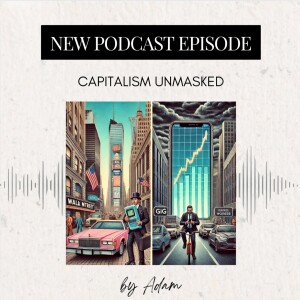
Wednesday Aug 21, 2024
Wednesday Aug 21, 2024
Hello again, and thank you so much for listening to me going on about something I know relatively little about. Now, today, I would like to delve into a topic that's as pervasive as it is misunderstood, and that is the subject of capitalism. Today, I would like to look at the rise of capitalism across Europe and specifically America. And I would like to draw a particular focus on the 1980s and beyond. It's a period that saw the intensification of capitalist ideas and practices. And those ideas and practices have shaped the world in ways which which are still profound and which affect us even today.
But beyond that, I would also like to touch on some of the myths surrounding capitalism and how it has been portrayed in popular culture. I would also like to think about why so many people struggle to grasp what exactly it is. Now, capitalism in its simplest form is an economic system where private individuals and businesses own the means of production, and where goods and services are produced for profit in a competitive market. It is a system that's often associated with the idea of freedom, innovation and opportunity. But the reality is far more complex. And the journey of capitalism through the 20th century and into the 21st century is a story full of contradictions, triumphs and failures.
As most people from my generation would attest to, the 1980s were a particularly transformative decade for capitalism. The world was coming out of the post-war consensus, a period roughly between 1945 and the 1970s, when many Western countries embraced a kind of mixed economy. There was a strong belief in the power of government to manage the economy, with significant state ownership of industries and robust welfare systems. This period, sometimes referred to as the golden age of capitalism, saw unprecedented economic growth, rising living standards and the expansion of the middle class. But by the 1970s, cracks, if not fault lines, in the system began to grow. The oil crisis, inflation, and economic stagnation led many to question the effectiveness of state intervention in the economy.
Enter the 1980s, a decade that marked the resurgence of a more laissez-faire approach to capitalism, spearheaded by figures like Ronald Reagan in the USA and Margaret Thatcher in the United Kingdom. These leaders, often seen as as champions of neoliberalism, sought to roll back the state. They wanted to reduce taxes, deregulate industries and promote a more free market economy. As you have it, Reagan and Thatcher's economic policies were built on the belief that markets, when left to their own devices, would naturally lead to prosperity. The idea was that by cutting taxes on the wealthy and businesses, you would encourage investment, which would then trickle down to the rest of society. This is where we see the myth-making around capitalism really take hold.
The 1980s popularised the idea of self-made. The entrepreneur who, hard work and determination, could rise to the top, amass great wealth and drive economic progress. This period also saw the birth of the modern financial sector as we know it. Deregulation led to the explosion of investment banking, The rise of the stock market and the birth of the high-flying, risk-taking culture epitomised by the yuppie figure. Young urban professionals who embodied the new capitalist ethos. These were the ones who, quite literally, bet on the future, leveraging massive amounts of debt to finance their ambitions, and in doing so, they reshaped the global economy. But it is also important to note that while this version of capitalism created immense wealth for some, it also exacerbated inequality.
This trickle-down theory didn't quite pan out as promised. Instead, wealth became increasingly concentrated at the top, while wages for the average worker stagnated. The gap between the rich and the poor widened, and social mobility, the idea that anyone could rise to the top, became more myth than reality. One of the most significant myths surrounding capitalism is the notion that it's synonymous with democracy and freedom. It is often said that capitalism promotes individual freedom because it allows people to make choices about their lives and careers, unencumbered by state control. But what this overlooks is that economic power can be just as coercive as political power. When wealth is concentrated in the hands of a few, those few have an outsized influence over politics, media, and society at large. Take, for example, the current power of Elon Musk and Rupert Murdoch.
This isn't just a modern phenomenon. It goes back to the very roots of capitalism. But the 1980s and beyond saw this dynamic landscape intensify. Another pervasive myth is that capitalism naturally leads to innovation and progress. While it can be said that profit motive can drive technological advancement, it is also true that capitalism can stifle innovation when it threatens existing profit margins. For example, large corporations often buy up patents and new technologies. They buy them not to develop them, but to prevent them from disrupting their existing businesses. This is particularly evident in industries like pharmaceuticals, where companies might suppress a new drug if it threatens the profitability of an existing one.
In popular culture, capitalism is often romanticised or demonised in ways that obscure its true nature. Films from the 1980s like Wall Street famously gave us Gordon Gekko, the ruthless corporate raider who declared that greed is good, greed is wonderful. Gecko is the epitome of the 1980s capitalist. Sharp, ambitious, but unscrupulously and utterly brutal. This film is a critique, of course, but it also helped cement the idea that capitalism is a game of high stakes, where the rewards for success are vast and the penalties for failure are devastating. Other movies to mention, like Working Girl or Trading Places, play with the idea of the American dream, where anyone with enough grit and determination can succeed in a capitalist economy.
But these narratives often gloss over the structural inequalities that make such success stories the exception rather than the rule. They promote the idea that capitalism is a meritocracy, where people are rewarded in direct proportion to their talents and efforts. In reality, factors like class, race and access to education play a massive role in determining economic outcomes. comes. Perhaps one of the biggest reasons people struggle to understand capitalism is that it's so often conflated with other concepts like democracy, free markets or even Western culture itself. Capitalism is not inherently democratic. Some of the most capitalistic societies in history have been authoritarian.
It's not synonymous with free markets either. Markets can exist in non-capitalist societies, and capitalism often involves significant state intervention, especially when it comes to protecting property rights or bailing out failing industries. Additionally, the global spread of capitalism has not been a uniform process. In Europe, for example, the trajectory of capitalism has been shaped by a variety of factors, including the legacy of colonialism, the experience of war and the influence of socialist and social democratic movements. The European model of capitalism, particularly in countries like Germany or Sweden, has tended to be more regulated with a stronger welfare state and labour protections compared to the more laissez-faire approach favoured in the USA. say.
The fall of the Soviet Union in 1991 is often seen as the triumph of capitalism over socialism, reinforcing the idea that capitalism is a natural or inevitable economic system. But this truly ignores the fact that the collapse of the Soviet Union was as much about the failure of political system as it was about the economic one. It also overlooks the various forms of capitalism that emerged in former communist countries, which often combined elements of state control with market mechanisms. Since the 1980s, we've seen the globalization of capitalism, with multinational corporations spreading their operations around the globe. And financial markets becoming increasingly interconnected. This has led to significant economic growth in some parts of the world, particularly in Asia, but it has also led to new forms of exploitation and inequality.
The promise of globalisation was that it would lift all boats, but in reality it's created winners and losers, with wealth flowing upwards to those who control capital. While many workers find themselves in precarious, often low-wage jobs. One of the most telling indicators of this shift is the rise of the gig economy. Platforms like Uber or Deliveroo often held as examples of capitalist innovation. Providing flexible work opportunities and disrupting traditional industries. But for many workers, a gig economy represents a step backwards, words, with little or no job security, few benefits, and wages that are often below the minimum needed to survive.
It is a stark reminder that capitalism is, in its current form, far behind the idealised version of freedom and prosperity that its proponents often promote. So why is it that so many people still struggle to understand capitalism? Part of it is that capitalism is incredibly complex and multifaceted. It is not just an economic system, but a social and cultural one as well. It shapes our identities, values and relationships. It is also constantly evolving, adapting to new technologies, political realities and social movements. This makes it incredibly difficult to pin down or critique in any straightforward or logical way.
Another reason is that capitalism is deeply embedded in our everyday lives. We're born into it and we often take its assumptions for granted. We're told from a young age that success means getting a good job, making money and buying things. We are bombarded with advertisements that equate consumption with happiness. In this context, questioning capitalism can feel like questioning the air we breathe. And there is also the fact that capitalism is often defended by powerful interests that benefit from the status quo. Corporations, media organisations and even governments have a vested interest in promoting a particular narrative about capitalism, one that emphasises its benefits while downplaying its drawbacks. This can make it difficult to have an honest conversation about the system's flaws and limitations.
Yet, despite all this, there are growing signs that people are beginning to question capitalism more critically. The 2008 financial crisis was a wake-up call for many. This exposed the fragility and inequality of the global economic system. The rise of populist movements on both the left and the right reflects widespread dissatisfaction with this status quo, and there's an increasingly high interest in alternatives to capitalism, whether that is through socialist policies, cooperatives, or other forms of economic organization.
Another point is that the climate crisis is forcing a re-evaluation of the sustainability of capitalism. The logic of endless growth and consumption, which at its heart is the ideology behind capitalism, is increasingly at odds with the ecological limits of our planet. This has led to discussions about green capitalism or even post-capitalism, economic systems that prioritise sustainability and social welfare before profit. it. These discussions are still in their infancy, but they signal a growing awareness that capitalism, as it currently exists, may not be compatible with the long-term health of our planet or our societies.
So where exactly does this leave us? It is clear that capitalism has been a powerful force for change, driving technological innovation, economic growth, so on, so on, and it has also lifted millions out of poverty. But it is also clear that it has serious drawbacks. Flaws that have become more pronounced in recent decades as inequality has risen, job security has eroded and environmental degradation has accelerated. The challenge moving forward is not just about understanding capitalism better, but to imagining and creating systems that address these flaws.
This doesn't necessarily mean abandoning capitalism entirely, but it does mean rethinking some of its fundamental assumptions. For example, it is possible to have a capitalist system that is truly equitable, where wealth and opportunity are more evenly distributed. Distributed can we have a form of capitalism that is sustainable where economic growth doesn't come at the expense of the environment these are fundamentally difficult questions and there is really no easy answer but they are questions that we must grapple with if we are to build a more just and sustainable world at the same time we must also be wary of the myths that surround capitalism capitalism.
These myths portray it as a perfect, self-regulating system that only fails when it is interfered with. The reality is that capitalism has always been shaped by laws, regulations and social movements. It has always required a degree of state intervention to function smoothly, whether it be in the form of property rights, enforcement of contracts or bailouts during crises. Acknowledging this doesn't mean we reject capitalism outright, but it does mean we need to approach it with a more critical eye and a nuanced perspective.
Many people must believe that capitalism is not just a monolith. It is a dynamic, evolving system that has taken different forms in different places and different times. Understanding its history, especially the pivotal change that took place in the 1980s can help us better navigate its complexities today. The rise of neoliberalism, the deregulation of financial markets, the globalisation of trade and investment, all of these developments have shaped the world we live in, for better or for worse.
But perhaps the most important takeaway is that capitalism, like any human system, is not inevitable. It was created by people, for people, and it can be changed by people. The question is not whether we can change capitalism, but how and in what direction. Will we continue down the path of increased inequality, environmental destruction or social fragmentation? Or will we find ways to harness the positive aspects of capitalism, its dynamism, its capacity for innovation, while mitigating its negative effects? sex?
These are the core questions, and they will require big ideas and bold actions to answer. But since more people around the world begin to question the status quo, there is hope that we can move towards a more equitable, sustainable, and humane economic system. It will not be easy, oh no, and it will not happen overnight. But the first step is to see capitalism for what it is, a complex but flawed but ultimately malleable system that we have the power to shape.
And so, as we continue to live in this capitalist world, it is crucial to keep asking questions, challenging assumptions and pushing for change. Whether through political activism, social movements or simply changing the way we live our lives, we all, you and me, have a role to play in shaping the future of our economy. After all, the story of capitalism is not just the story of the rich and powerful. It is our story too. So anyway, thank you so much for listening, and I hope that this little ramble has given you some food for thought. This is the rise of capitalism, and we must focus on the myths that surround it, and think about the possibility for its future. Until tomorrow, please keep thinking and I hope to see you again very, very soon.

Tuesday Aug 20, 2024
Tuesday Aug 20, 2024
Hello, good morning, and thank you for joining me on another intriguing exploration. Today, we delve into the fascinating world of fright. It's that heart-racing, palm-sweating sensation that many of us actively seek out, despite its often unpleasant effects. From horror films and haunted houses to extreme sports, the allure of fear is undeniable.In this episode, we explore the fight-or-flight response, an evolutionary mechanism designed to keep us safe from danger. But why do some people relish the thrill of fear while others avoid it at all costs? We dive into the biological, psychological, and social factors that influence our relationship with fright.Discover how our brains react to danger, the role of dopamine, and the concept of benign masochism. Learn about the psychological makeup of thrill-seekers and the impact of cultural norms on our perception of fear. Whether you're an adrenaline junkie or prefer the comfort of routine, this episode offers insights into the complex and multifaceted experience of fright.Join us as we uncover the power of fear to shape our lives and the incredible diversity of human responses to it. Whether you seek out fright or shy away from it, there's something to be learned about who we are and what it means to be alive.Thank you for listening. Goodbye.
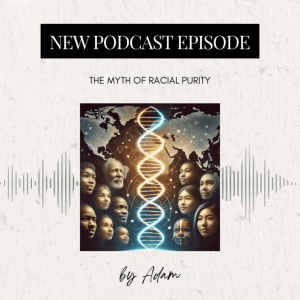
Monday Aug 19, 2024
Monday Aug 19, 2024
In this episode, we dive into the deeply rooted subjects of racism and xenophobia, exploring their baseless foundations through scientific evidence. Discover how the concept of race as a biological determinant has been repeatedly debunked, emphasizing the incredible homogeneity of the human species.We trace the genetic heritage of humanity, highlighting our shared origins and the extensive intermingling that has shaped populations over millennia. Through examples from Britain and the United States, we reveal the complex genetic landscapes that challenge the notion of racial purity.Join us as we dismantle the myths of racial superiority and purity, armed with the knowledge that our DNA tells a story of interconnectedness and shared humanity. Celebrate our diversity and work towards a world where artificial barriers of race and ethnicity are dismantled once and for all.

Sunday Aug 18, 2024
Sunday Aug 18, 2024
Hello, good afternoon, and thank you again for taking the time to listen to me going on about stuff. Today, I want to dive into a topic that's been on my mind, and I think many people's minds recently, and that is artificial intelligence. I know that AI might might sound rather futuristic or sci-fi to many people, but it's a lot more integrated into our daily lives than most people realize.In this episode, we break down the basics of AI and explore its different forms: narrow AI, general AI, and superintelligent AI. We'll delve into the current applications of AI, such as virtual assistants and recommendation systems, and discuss the potential future where AI could revolutionize problem-solving across various fields.We'll also address the fears and anxieties surrounding AI, from job displacement to ethical concerns, and the existential risks posed by superintelligent AI. The episode will highlight both the opportunities AI presents, such as advancements in healthcare and climate change mitigation, and the challenges we must navigate, including bias, privacy issues, and the need for lifelong learning.Join us as we explore how we can prepare for an AI-driven future, the importance of education and continuous learning, and the role of government and businesses in supporting workers through this transition. We'll also discuss the controversies surrounding AI and emphasize the need for ethical development and thoughtful regulation.By the end of this episode, you'll have a clearer understanding of AI's impact on our lives and the steps we can take to ensure it benefits everyone. Thank you for joining me, and let's work together to shape a future where AI can benefit the entire human race. Until next time, take care.



